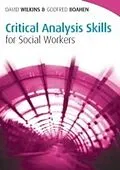Analysis is a critical skill for social workers, yet it is a skill that many practitioners find very difficult. This book will help social workers to improve their analysis skills by offering a very basic, step-by-step model to develop an analytical mindset. It shows how analysis can be woven into the whole process of social work engagement, resulting in better decision making, more efficient ways of working and, ultimately, better outcomes for social work service users.
The chapters include:
- Tools for developing a critical mindset
- Extended case studies
- Practice dilemmas
- Research summaries
- Exercises
- Reflection points
- What analysis is, and why it is such an important skill in practice
- The skills that underpin critical analysis, e.g. time management, planning, critical understanding, logical thinking, research-mindedness, creativity, communication, reflection and hypothesising
- The role of emotion and intuition in critical analysis
- Models to aid critical analysis
- The importance of supervision, and the idea that good analysis does not happen when social workers try to do it on their own
"Successive reports into social work training, as well as their practice after qualification, identify gaps in professionals' capacity for critical analysis. This excellent book contains thought-provoking examples, each derived from an authentic practice-base and theoretically driven models. Here we have a compelling text which social workers at all stages of their careers should view as essential reading."
David Shemmings, Visiting Professor of Child Protection Research at Royal Holloway, University of London, UK
"A timely and appropriate post-Munro book for social workers at all levels of experience. The chapter on emotion, intuition and critical analysis is a particularly welcome addition to the subject. A really useful book."
Dr Jane Reeves, Director of Studies, M.A. Child Protection, Co-Director Centre for Child Protection, University of Kent, UK
"This is a quite splendid book. Sane, fresh, accessible, reader-friendly and a pleasure to read. Taking the meaning skills of critical analysis as the spine of good practice, Wilkins and Boahen have given us a book that succeeds in engaging readers equally at different levels - and one different from anything else on the market."
Professor Ian Shaw, University of York, UK
Zusammenfassung
Dr David Wilkins is a Senior Lecturer at the University of Bedfordshire, UK.Dr Godfred Boahen is a Policy and Research Officer at the British Association of Social Workers (BASW), UK.How can social workers develop their critical analysis skills? What role does critical analysis play in the day-to-day activities of a social worker? And can we critically analyse in isolation?The ability to analyse contexts, scenarios and service users through a critical lens is vital to effective social work practice. Despite this, many social workers attempt to analyse situations alone, missing marks of significance. This book, written by two senior academics and practitioners who, at the time, were in the midst of their PhDs, offers a basis step-by-step model that busy social workers can use to develop a more critical and analytical mindset. It shows how analysis can be woven throughout the whole process of social work engagement, resulting in more effective decision-making, more efficient ways of working and, ultimately, better outcomes for social work service users. This is achieved by ways of handy tools, case studies and dilemmas, research summaries, and exercises and reflections points to tackle alone or with a colleague.Topics covered include:What analysis is, and why it is such an important skill in social work practice.The skills that underpin critical analysis, such as time management, planning, critical understanding, logical thinking, research-mindedness, creativity, communication, reflection and hypothesising.The role of emotion and intuition in critical analysis.The importance of supervision and team or supervised analysis.***This book forms part of the Social Work Skills in Practice series. The series focuses on key social work skills required for working with children and adult service users, families and carers. The books offer both theoretical and evidence-informed knowledge, alongside the application of skills relevant for day-to-day social work practice. They are an invaluable resource for pre-qualifying students, newly-qualified social workers, academics teaching and researching in the field, as well as social work practitioners, including practice educators, pursuing continuous professional development.***'A timely and appropriate post-Munro book for social workers at all levels of experience. The chapter on emotion, intuition and critical analysis is a particularly welcome addition to the subject. A really useful book.'Dr Jane Reeves, Director of Studies, M.A. Child Protection, Co-Director Centre for Child Protection, University of Kent, UK
Inhalt
Part One: Overview of Analysis
Chapter One: Introduction
Chapter Two: What is Analysis and Why is it Important?
Chapter Three: Skills Needed for Good Analysis
Chapter Four: Approaches to Analysis
Chapter Five: Developing an Analytical Mindset
Chapter Six: Tools for Analysis
Chapter Seven: Analysis in Practice
Chapter Eight: Extended Case Examples
Chapter Nine: Analysis and the Role of Supervision
Chapter Ten: Conclusion
